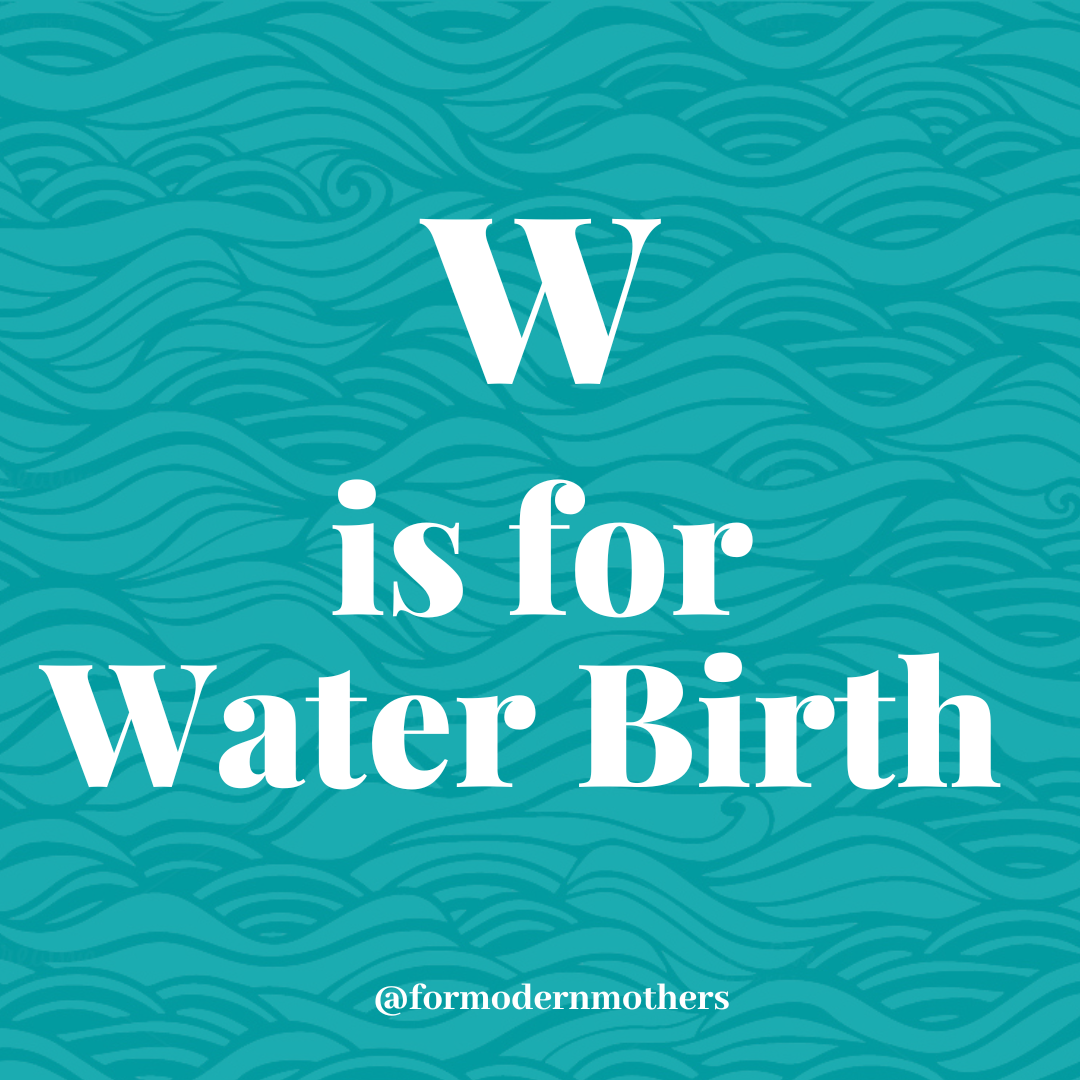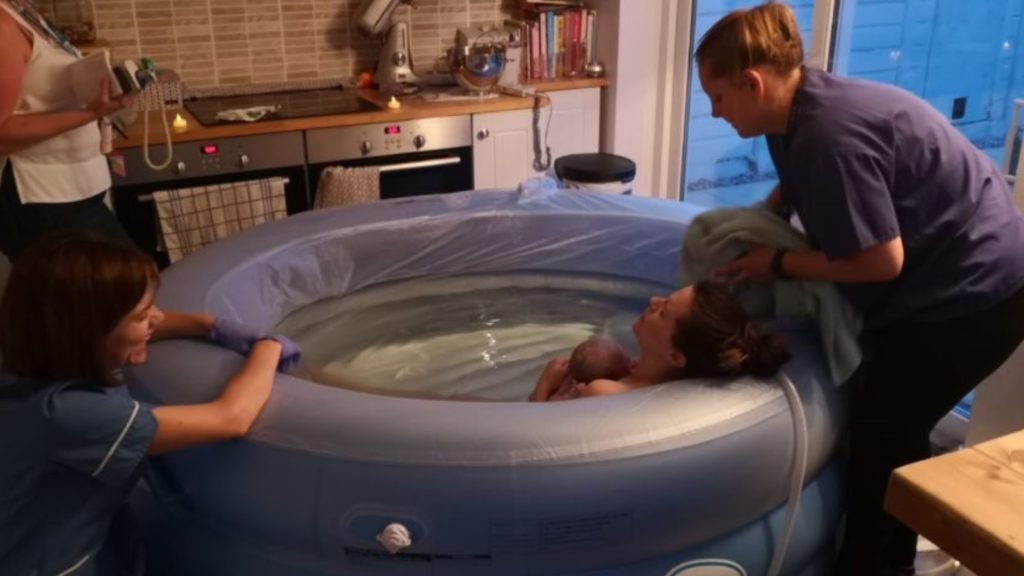W is for Water Birth
Lets talk about water birth
So let's talk water birth. Its probably something you’ve heard about, often people think they might like a water birth, but also understandably you probably have questions (there’s always lots of questions on my hypnobirthing and antenatal courses). You might not know quite what it entails, where you can birth in a pool, or what all the benefits are. So I’m going to shed some light on all of that. As well as telling you a little about some of the research about water births (because I’m a research and science geek!). Because sometimes there's some myths or outdated misinformation around.
So this blog post is all about explaining what a water birth is, why it might be helpful, some of the benefits of it some of the reasons you might want to do it, some of the research that is about it so that you can consider that and make your choice based on what's right for YOU..
The benefits of water for birth
Pain relief. So water can be a really positive form of pain relief for people in labour. It can take the edge off the discomfort of surges (contractions) and several different studies have shown that women who birthing water report lower perceived levels of pain and less pain medication than there counterparts on dry land.
Reduced tearing. Studies have also shown that you're less likely to tear in water. Maybe that's due to being more relaxed. Maybe that's due to being less observed in a pool. Maybe it's due to the counter pressure of the water on your perineum. It could be any of those things. Of course it doesn't guarantee you won't tear (nothing can, although there are things that can help reduce the likelihood - see separate blog post for that).
Feels good Water is of course supportive to the whole of your body. And that can just feel really nice in labour, when you're often feeling quite heavy and cumbersome and movement is not see easy at the end of pregnancy. So the water will give you a freedom of movement and support which can feel lovely. If you feel good, and feel relaxed, and more comfortable then that of course will be helping you birthing hormones to flow too. Win-win.
Movement and positions. As well and being free to move, you can also more easily changing positions in the water. In labour that in itself can help with comfort and decreased pain because you can move more your pelvis can move more and so baby can get into the position they need to more easily too. As you more easily respond to the sensations in your body and move into positions that feel more comfortable for you, you’ll be helping your baby's navigation down through your pelvis. So using active birth positions in labour, in combination with the pool can be really helpful. We look at active birth, postions in labour and biomechanics for birth in my antental and hypnobirthing course, and we practice them in my pregnancy yoga classes too.
Privacy and being unobserved. A birth pool if like a big higher sided bath, with lots of room to move around. I guess it’s a bit like a hot tub, but please do not use a hot tub - that is not advisable. But being in the pool gives you that feeling of privacy. You've got these walls around you. You are not as vulnerable to people seeing you, touching you, poking you, prodding you. All of those things make a huge difference feeling safe, secure, private, unobserved. And in turn all of those things are helping you promote and support your birth hormone response, which is driving the whole process of labour. So the birth pool can help and support the hormones and the physiology of labour, because of that kind of ‘nest like’ feeling that it gives you.
If anybody wants to do a vaginal examination for example, you're going to have to get out of the pool and make a conscious effort to do that. So that feelings of privacy and protection and security that help you oxytocin levels and keep labour progressing are so important and so pool and water births can help in that too.
A conscious positive choice. It could also be that people who choose to birth in water have made a conscious positive decision about their choices and what they might want. And by making those positive conscious choices you are supporting yourself and your own needs and what feels good in your body. And so that kind of confidence and empowerment it can you, may also help with the feeling of being able to advocate for what you want and making your own choices and decisions. So that can be really hugely beneficial. It can give you confidence, and feel more empowered.
Of course it really doesn't matter if it is the positive attitude, if it's the feeling of privacy, if it's the the movement, or if its the feeling of warm water around you that just feels so lovely to you. It doesn't really matter why - but it just matters that it has that positive effects for YOU.
It's also worth noting and really important to say that for some women they might know in pregnancy water birth is not for them. Or you may think you’ll bloody love it, but you get in the pool in labour and find actually it isn't for you. That's absolutely okay, just get out again.No one minds. You can get in and out and be on dry land. You don't know exactly how you will feel until you're in the moment. And the main thing is that you respond to how you do feel in the moment so you can change your mind or you can just go ‘Yeah, it's not for me’. Or you may know it's not for you, and say I'm not even going to try it. And that is absolutely fine too.
Water Birth - your questions answered
Here's some questions that I get asked often about water births on my courses and in my classes. If you have other questions then just let me now, I’m always happy to help and support you.
Can you pre-book a pool in a hospital?
People talk about water birth in hospital and if you can guarantee you’ll get a pool. And unfortunately you can't guarantee because not every birthing room in hospital (certainly in the UK) has a pool. Some have a pool, some have a big bath that can be helpful, others simply don’t.
Now in birth centres or midwife led units more of the rooms will have a pool, as there’s a greater expectation you’ll want to use one. But I would suggest you'd speak with your chosen birth centre or midwife led unit to find out.
But you cannot ‘pre booked’ them - because no-one knows when you're going to go into labour. It is simply a case of being first come first served. So if there's already someone in those rooms, they’re all full, they you won’t be able to.
If you absolutely really want to use a pool (or think you will) then often it can be a big driver why people choose a homebirth - becuase no-one is going to be in that pool are they!
What are hospital pools like?
See the images below this Q&A section to see what they look like.
Birth pools at home - where do I get one?
You hire or buy in inflatable pool, it’s not something the NHS provide for homebirths here in the UK. Occasionally, they provide them at a subsidised rate and that has happened here locally, but it's not happening at the moment. So you’ll need to hire, rent or buy a pool for your own use at home. Which of course guarantees that there is a pool available - because it's your pool. You can often borrow one from your local homebirth support group - locally here’s a link to the one in York https://www.facebook.com/groups/homebirthinyork You could try Facebook marketplace locally, as people will have pools they've used and then sell them on. So you’ll just need to buy the disposable liner pack for your pool. If you are in or around York then do check out Cathy of https://www.happyhomebirth.co.uk/ who rents home who rents pools and is really super knowledgeable about pools and about homebirth too.
How long does it take to fill the pool.
That depends on your water pressure and where you live. If you have constant hot water that might be much quicker than if you've got to heat a tank and empty your tank and how big your tank is, which varies on individual properties. But the pools have a cover to keep them warm. So you would cover that until the pool is the tank is reheated and then you would fill some more so to keep the heat in. It is best to start filling the pool at the kind of earliest twinges of labour because you don't want to be too late filling the pool.
Can I have pharmacological pain relief in the pool?
You can have gas and air, but not opiod drugs like Pethidine or Meptid (until they have sufficiently worn off), nor an epidural or spinal block. Research has shown that women who use birth pools are less likely to need other pain relief - see the research towards the end of this post.
Why doesn't the baby breathe underwater?
Now this is something people always ask on my Courses. How does the baby not take in a big lung full of the pool water? So babies don't take their first breath until they're born. They've been in the amniotic fluid in the womb, surrounded by and breathing it while they've been in utero throughout your pregnancy. They don't take their first breath of air until they their head is lifted above the water. There are receptors on the face near the mouth and the nose that that sense the air, and that stimulates baby to take their first breath. Once they've taken their first breath they must not go back under the water. So even though they've been born in the water they're still getting oxygen from your placenta through the umbilical cord until they take that first breath of air.
How deep should the water be.
It's really important that the pool is deep enough that obviously your bottom is fully submersed during the birth. Again because it baby was partly born, if just the head had been born and the rest of the body was still to come. It needs to be deep enough so that if you move then you don’t bring babies head out of the water (if you did then simply do not put their head back under). That’s why you use a specially designed birth pool (not a bath, hot tub or paddling pool - yes people have asked me this!) filled to the marked level to be safe and to get the full benefits of buoyancy and that weightlessness too.
When should I get in the pool?
The choice is yours. You can get into the pool or in the bath at home or the shower whenever you want to in really early labour. Some people get in the bath in early labour because it's something they can do at home, helps relax them and feels good. Even if they plan to go to hospital birth centre, the bath or shower water be relaxing and supportive of the birthing hormones. Some people get in water once they get to the birth centre or hospital. Sometimes getting in the pool can slow the labour down. I've heard that from midwife friends. If your labour does slow down don't worry. Maybe it's just in early labour getting underway. Maybe it's time to chance to take a pause so have a rest. Why not? If you're in hospital or the birth centre be guided by your midwifes suggestions, she might suggest you change something sometimes in labour just changing something getting in the pool out of the pool. Doing something a bit different moving around might be helpful.
What temperature should the water be?
You get a thermometer to monitor the water temperature and it's between 32 to 38 degrees. Again, if you feel it's too hot or too cold then it probably is it's really important that you don't shiver. Shivering being too cold is definitely a type of stress response. You don't want to be stressed as we know in labour.
What should I wear in the birth pool?
The answer really whatever you feel comfortable with. You might want to wear no clothes at all. Absolutely fine. You might want to wear a bra top or a bikini top.
Can my partner get in with me?
Yes, if you want them to. Then they can again make sure they though are wearing swimming shorts. No naked partners in the pool and midwife will not be happy with that!
Do I have to get out of the birth pool to be monitored or examined?
If you choose to have a vaginal examination, then you will need to get out of the pool to have a vaginal examination to check dilation. But again, vaginal examinations just like all kind of monitoring is optional. It is your choice.
For monitoring baby midwives should be able to monitor baby's heartbeat using an underwater Doppler or using wireless telemetry, so causing minimum of disturbance to you and your labour.
If my baby's born in the water, when should I get out?
As long as everyone's happy and healthy, and there's no concerns for you or for baby then there's no rush. Some people like to stay in the pool with the umbilical cord attached while they say hello to baby. It can be a lovely transition a gentle way to make their way into the world and have skin to skin in the pool with a towel over the top of baby to keep them warm (and obviously keeping you warm as well is important) And some women also birth the placenta in the pool. Sometimes you might want to be out of the pool, and that’s fine too. Or you might need to get out of the pool and dry off and then move positions for the placenta. So again, it's up to you and your midwife can suggest things too of course.
Birth pools in a birth centre or hospital
They are fixed sided, and look something like this…
Birth pools for a homebirth
For a homebirth here’s some images of the inflatable pools
Pool liner, tap adapters and thermometer pack
Water Birth Resources & Research Studies
There are many research studies demonstrating the benefits of water for labour and birth. We have evidence from research involving hundreds of thousands of women and babies that using water for labour and birth is safe and leads to good outcomes.
Using water also brings advantages, including less need for other kinds of pain relief and increased maternal satisfaction.
A very recent research review looked at randomised controlled trials comparing waterbirth to landbirth. It found that Women who have waterbirth experience less pain, are less likely to need epidural/spinal anaesthesia and are more satisfied after their birth (Edwards et al 2023). The reason this review is small is that, although we have data from tens of thousands of waterbirths showing that water immersion and water birth are safe and satisfying, there aren’t many randomised controlled trials on this.
In Edwards et al's (2023) review, both labour augmentation (when an oxytocin drip is used to try to speed up labour) and neuraxial anesthesia (spinal or epidural) were less common in those who had waterbirth. And in addition many outcomes did not differ between the two groups, including estimated blood loss, postpartum hemorrhage, perineal laceration, episiotomy, mode of delivery, and perinatal outcomes. This again confirms that waterbirth is no less safe than land birth, and it carries some advantages in terms of maternal pain and satisfaction.
A Swedish comparative study by Ulfsdottir et al (2017), found that women giving birth in water had a lower risk of second-degree perineal tears, shorter labours and significantly less interventions (including artificial rupture of membranes, internal continuous fetal monitoring and augmentation with synthetic oxytocin).
There were no differences in Apgar scores or admissions to neonatal intensive care unit and the women reported a more positive birth experience.
For more research and evidence on water birth these are respected resources:
Dr Sara Wickham - https://www.sarawickham.com/research-updates/more-benefits-of-water-for-birth/
Evidence Based Birth has some good resources too here: https://evidencebasedbirth.com/waterbirth/
Want to know more?
I hope all that’s helpful. I love sharing my knowledge, empowering women and couples, and providing information for you to make choices that are right for you and your baby. Let me know if you’ve any other questions about water birth, or anything else you’d like to see on the blog. And of course do come along to one of my Antenatal and Hypnobirthing Courses, where you’ll learn about all you birthing options and so, so much more.
Susan x






